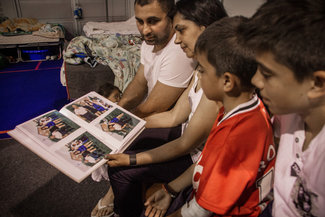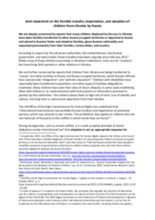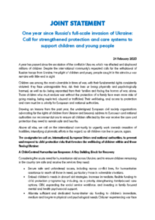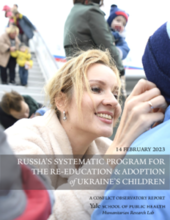

Displaying 151 - 160 of 1079
This interagency document is open to endorsement by organizations, networks and agencies and we hope that you will consider adding your name to it and use it in your work and advocacy on behalf of children’s rights in Ukraine.
At its resumed eleventh emergency special session, the world body adopted a new resolution calling for an end to the war, only hours before the conflict enters its second year on Friday, 24 February 2023.
In this joint statement, the co-signatories call on international, European Union and national authorities, to prevent and respond to child protection risks that threaten the well-being of children within and those fleeing Ukraine.
The United Nations overwhelmingly isolated Russia on Thursday, marking one year since Moscow invaded Ukraine by calling for a "comprehensive, just and lasting peace" and again demanding Moscow withdraw its troops and stop fighting.
The UN General Assembly on Thursday called for ending the war in Ukraine and demanded Russia’s immediate withdrawal from the country, in line with the UN Charter.
SOS Children's Villages Russia issued a press release in response to an article in a recent German publication alleging that the organization was involved in the forcible removal of children from Ukraine.
Seit Kriegsbeginn verschleppt die russische Armee ukrainische Kinder - in Russland droht ihnen Umerziehung. Laut frontal-Recherchen sind SOS-Kinderdörfer möglicherweise verstrickt.
A report by Yale Humanitarian Research Lab’s Conflict Observatory identifies Maria Lvova-Belova is one of the most highly involved figures in Russia’s deportation and adoption of Ukraine’s children, as well as in the use of camps for ‘in
Hundreds of Ukrainian kids are being transferred into Russia from the territories it has occupied in East Ukraine. The Kremlin says they're saving them; Kyiv claims genocide.
This report published by the Yale School of Public Health’s Humanitarian Research Lab (HRL) documents the relocation by Russia of at least 6,000 children from Ukraine to a network of re-education and adoption facilities in Russia-occupied Crimea and mainland Russia.




